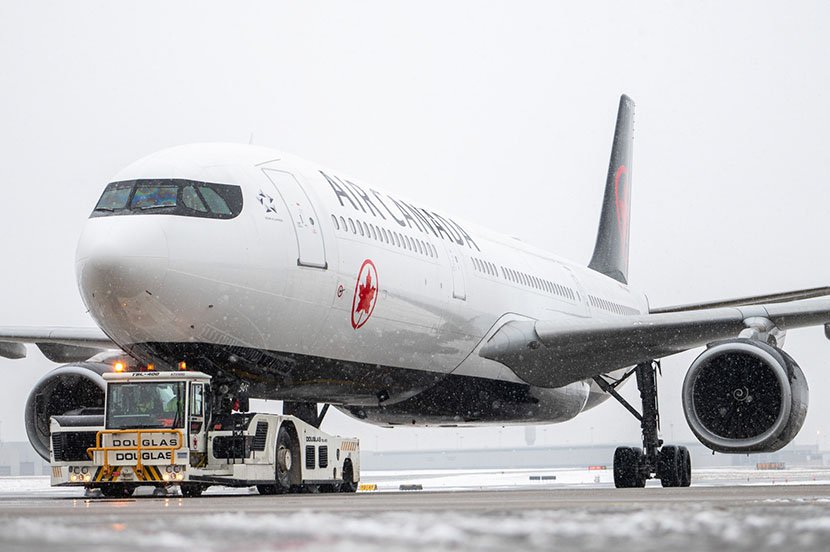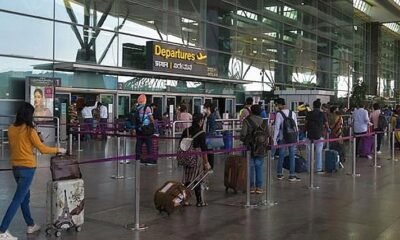Travel Guides & Articles
India and Sri Lanka Seamlessly Connected Through Air Canada and THAI Airways New Powerful Expanded Codeshare Agreement Starting This August

Published on
August 12, 2025
Air Canada and THAI Airways have taken their relationship “to a higher level” this August, with the signing of an expanded codeshare agreement promising a connectivity boost for India and Sri Lanka. The strategic collaboration will allow passengers to travel seamlessly from key cities in India and Sri Lanka to Bangkok and vice versa with direct connections between Delhi, Mumbai, Kolkata, Colombo. The expanded network caters to the increasing preference of travellers for quicker travel routes and provides customers with more choice, convenience and a better overall passenger experience.
In a significant move to broaden their reach and enhance travel connectivity, Air Canada and THAI Airways have announced an expansion of their existing codeshare agreement. Effective from August 21, 2025, the expanded agreement will provide passengers with easier access to an additional nine destinations, predominantly across India, alongside Colombo, Sri Lanka. This expansion allows passengers flying with either airline to seamlessly book flights across these new routes, significantly improving travel options between Southeast Asia, North America, and India.
The addition of these new destinations is a strategic development for both airlines, enabling them to tap into the growing demand for air travel between India and Southeast Asia. With both Air Canada and THAI Airways being part of the Star Alliance network, the codeshare arrangement strengthens their global position, offering more convenience and flexibility for travelers.
Expanded Coverage with New Codeshare Routes
Through the expanded codeshare agreement, Air Canada and THAI Airways will operate a range of shared routes, linking prominent Indian and Sri Lankan cities with Bangkok Suvarnabhumi, the main international hub for THAI Airways.
| Routes Operated by Air Canada through THAI Airways | Routes Operated by THAI Airways through Air Canada |
|---|---|
| Bangkok Suvarnabhumi to Bangalore/Bengaluru | Montreal to Delhi |
| Bangkok Suvarnabhumi to Chennai | Toronto to Delhi |
| Bangkok Suvarnabhumi to Colombo | |
| Bangkok Suvarnabhumi to Delhi | |
| Bangkok Suvarnabhumi to Hyderabad | |
| Bangkok Suvarnabhumi to Kolkata | |
| Bangkok Suvarnabhumi to Mumbai |
These new routes will be operated by THAI Airways, enabling travelers to book direct flights to and from key Indian cities, including Bangalore, Chennai, and Hyderabad. The routes will connect passengers to THAI’s expansive network, offering better connectivity to other Southeast Asian destinations and beyond.
Air Canada, in turn, will operate flights from Canada to Delhi, India, strengthening its position in the Indian market. The Montreal-Delhi and Toronto-Delhi routes will allow passengers from Canada to conveniently connect with the vast network of THAI Airways in Asia.
The Benefits of the Expanded Codeshare Agreement
The codeshare agreement between Air Canada and THAI Airways offers several key benefits for travelers, airlines, and the aviation industry as a whole:
1. Improved Connectivity Between Key Markets
The inclusion of Indian cities and Colombo in the codeshare partnership significantly enhances connectivity between Southeast Asia and India. Both regions have seen a rapid increase in passenger traffic, especially for business and leisure travelers. By offering direct connections between Bangkok and major Indian hubs like Mumbai, Delhi, Chennai, and Kolkata, the airlines can cater to a wider range of passengers, offering convenient travel options with minimal layovers.
For passengers traveling from North America, the expanded codeshare agreement opens up multiple routes to India, making it easier to explore key destinations across the subcontinent. This is particularly beneficial for business travelers, who often require flexible scheduling and seamless connections to their destinations.
2. Seamless Travel Experience
Codeshare flights allow passengers to book connecting flights on a single ticket, eliminating the need for separate bookings. This provides a seamless travel experience, with checked luggage transferred automatically to connecting flights, reducing the hassle of re-checking bags. Passengers will also benefit from coordinated flight schedules, which minimize layover times and improve overall travel efficiency.
3. Enhanced Customer Service
Both Air Canada and THAI Airways are known for their high standards of customer service. With the new codeshare agreement, travelers will enjoy the combined benefits of both airlines, from in-flight services to ground assistance. Whether traveling for business or leisure, passengers can expect smooth transitions between flights and well-coordinated service in both airports and on board.
4. More Choices for Passengers
One of the most significant advantages of the expanded codeshare agreement is the increased number of travel options available to passengers. The new routes cover both popular destinations and more niche locations, offering something for every type of traveler. Whether it’s a direct flight to a major metropolitan city or a regional hub, the codeshare partnership ensures that there are more flight choices and increased flexibility in terms of departure times.
5. Access to Star Alliance Benefits
As members of the Star Alliance network, both Air Canada and THAI Airways offer additional perks to passengers, such as frequent flyer miles, priority boarding, and access to lounge facilities at airports worldwide. For travelers who are part of a frequent flyer program, the expanded codeshare agreement means they can earn and redeem miles across a broader range of routes and destinations.
Strategic Importance of the Agreement
This expanded codeshare agreement also comes at a time when both Air Canada and THAI Airways are focusing on growth in key international markets. India, with its growing economy and increasing number of international tourists, is a market that both airlines are eager to capitalize on. Moreover, Colombo, Sri Lanka, as a growing tourist destination, is another key addition to the new route network.
Air Canada and THAI Airways are enhancing their foothold in these regions, striving to establish themselves as dominant players in the aviation markets of Southeast Asia and India. The collaboration also allows them to better compete with other international airlines operating in these key regions.
For passengers, this development brings better access to some of the most sought-after travel destinations in the world. The ability to connect from Canada and Southeast Asia to India and Sri Lanka with fewer stops makes international travel more convenient and attractive. This partnership will appeal to a wide variety of travelers, from business executives and tourists to students and families, who can all benefit from easier access to these destinations.
Why This Expansion Matters for Travelers
The expansion of the Air Canada and THAI Airways codeshare agreement has significant implications for air travelers. Here are some reasons why this is an important development:
1. Increased Frequency of Flights
With these added destinations, travelers can enjoy more frequent flight options. The codeshare agreement will offer enhanced flexibility, particularly for those with tight schedules or last-minute travel plans.
2. Streamlined Booking Process
Travelers booking tickets for multiple destinations through the expanded codeshare network will find the process much easier. Instead of having to book separate flights with different carriers, passengers can now do everything in one go, saving time and reducing confusion.
3. Greater Travel Flexibility
The addition of these new routes means travelers can now plan their trips with more options. Whether they need to travel to a regional hub like Chennai or Kolkata or make a connection to Colombo or other destinations, the codeshare agreement allows for greater flexibility in planning and executing their travels.
4. Cost-Effective Travel
The ability to book a single ticket for multiple destinations, along with the combined loyalty rewards offered by both airlines, may lead to more cost-effective travel solutions for passengers. The flexibility in choosing from various destinations can also lead to competitive pricing, making it more affordable for travelers to visit different countries.
5. Improved Business and Leisure Travel
Whether you’re flying for business or pleasure, the expanded codeshare network means you can travel more efficiently. Business travelers can now easily fly between major cities in Canada, Thailand, and India with fewer layovers and quicker connections. On the other hand, leisure travelers looking to explore South Asia and beyond will find the new routes provide more convenient options.
The creation of a expanded codeshare agreement between Air Canada and THAI Airways helps to facilitate more travel opportunities from Canada to Thailand, India and Sri Lanka. The newly added nine markets to their network allows for greater choice, flexibility and service for passengers whilst the both airlines take a stronger foothold in key global regions. The new collaboration is poised to change the idea of convenience, for those who need transportation whether traveling on business to India or on vacation in Sri Lanka.
Air Canada and THAI Airways will offer enhanced connectivity between India and Sri Lanka this August, thanks to an extended codeshare agreement. Their partnership brings a range of travel options between cities in both countries via convenient connections which are designed to offer more flexibility and choice for passengers, fulfilling the growing demand for efficient travel routes.
As the codeshare evolves, customers will continue to enjoy access to various global destinations across the world and a seamless booking experience combined with travel fares coupled with all the benefits offered by Star Alliance network partner airlines. The Air Canada / THAI Airways partnership means that no matter if you’re flying for business or pleasure international air travel just got a lot easier.
Travel Guides & Articles
GST hike to make premium air travel costlier

The Goods and Services Tax Council has raised the levy on non-economy air travel from 12% to 18%, a move experts believe will drive up fares for passengers travelling in premium economy (PE), business and first class.
While the rate for economy travel stays unchanged to keep airfares affordable for mass travellers, the steeper GST on upper classes has triggered concern among airlines and online travel agents. Prior to the Council announcing the new tax regime on Wednesday, two major airlines requested for GST on all classes to be brought to 5%, three government officials confirmed to HT.
Former president of Travel Agents Federation of India (TAFI) Ajay Prakash said the new GST rate has come at a time when the Indian aviation market is going through a “very sensitive phase”.
“Increasing the GST for upper class fliers directly means airfares for all the three classes will shoot up,” he said. “While the government claims to promote Indian aviation by bringing in big aircraft, etc., levying higher GST is only going to discourage individual fliers to book on non-economy classes.”
Jitin Makkar, senior vice president and group head of corporate sector ratings in ICRA Limited, noted the additional levy will be passed on to the consumers.
An airline insider requesting anonymity said that the increase is no revolution but it is enough to make airlines rethink budgets and booking strategies. “Let alone the Air India crash (June 12 disaster that claimed 260 lives) that shook passenger confidence, Indian airlines are facing major troubles due to the ongoing Pakistan airspace closure leading to more flying time and increased airfares. At such a time, it was needed that the sector be allowed to remain untouched,” the official said.
A former airline official echoed similar views, saying, “India has only two major airlines now –– while one is trying to regain passenger trust while facing a loss of ₹5,000 crore due to Pakistan closing its airspace, the other (IndiGo) has just entered into the segment and launched its business product.”
Sheldon Hee, regional vice president, Asia Pacific, International Air Transport Association (IATA) termed the move “disappointing”. IATA is a global trade association of airlines, representing around 300 airlines or about 80% of worldwide air traffic and acts as a global voice of the airlines.
“In many ways, India has been an amazing aviation story with its impressive growth, record aircraft orders, and world class infrastructure. Aviation has tremendous potential to contribute to India’s economic growth, both directly as Indian airlines grow, and indirectly through increased connectivity for travellers and businesses alike. It is, therefore, disappointing to hear of a decision to increase the GST on non-economy travel with no clear justification,” Hee said.
“This increase runs counter to the efforts of Indian carriers, which have been investing in their premium products to enhance the travel experience on their flights. Tax on non-economy air travel has risen dramatically –– GST is at 18% after yesterday’s announcement, compared to the 8.6% rate in 2017 under the service tax regime.”
Hee also said that for its aviation industry to thrive, India needs to take a whole of government approach in considering broader policy and consider the risks of such policies on dampening demand and undermining profitability in order for its aviation industry to thrive.
“Asia Pacific airlines are forecast to only earn $2.60 per passenger in 2025. Taxing premium travellers, where these customers often make a difference to a route’s viability, is counterproductive,” he added.
Makkar, however, said that the increase should not have a significant impact on the business class segment considering this segment’s low price elasticity, though there could be some amount of downtrading to the economy segment.
“By keeping rates stable for economy travellers, this measure is likely to ensure continued affordability, thus making air travel more accessible,” he concluded.
Travel Guides & Articles
Industry’s finest to be recognised at the India Travel Awards on 9 September in Delhi – Tourism Breaking News

Travel Guides & Articles
Festive travel packages by Thomas Cook India and SOTC Travel

Traditionally, Indian festivals have been celebrated at home or in ancestral houses, with families gathering under one roof. Recently, Indian consumers have also been choosing to travel and celebrate festivals with multi-generational family units and friends.
Thomas Cook India and SOTC Travel’s India Holiday Report 2025 highlights this shift in consumer behaviour, with demand for longer festive breaks, higher holiday spends and interest in experiences ranging from heritage and luxury stays to cruises and new destinations.
To tap into this growing festival travel trend, Thomas Cook (India) Limited, an omnichannel travel services company, and its Group Company, SOTC Travel, have introduced a specially curated range of holidays for the upcoming festive season, featuring special group tour departures from Kolkata for Durga Puja and Karnataka for Dussehra, as well as from high-potential markets of Gujarat and Maharashtra. In addition, the companies have also announced special Diwali departures across key pan-India markets.
The companies have also announced a special offer: discounts of up to Rs.10000 per transaction across select holidays via HDFC credit cards.
Festive tourism trends
Longer stays and increased spends: From the traditional 3 days Indians are now extending their stays to 6-12 days (multi-generational families combining school vacations like Dussehra, Durga Puja and Diwali). Young India’s millennials/GenZ and working professionals are embracing extended trips, combining weekends with festival holidays for a 5-6 day break
Favourite destinations:
-
Domestic & Indian Subcontinent: Andaman, Kerala, Kashmir, Himachal Pradesh, Rajasthan, Goa, Karnataka, North East, Sri Lanka, Bhutan and Nepal
-
International: Thailand, Singapore with Bintan, Malaysia, Sabah, Indonesia, Vietnam, Oman, Australia-New Zealand, Switzerland, France, Finland, Japan, Georgia, Germany, Spain, Austria, Kenya, South Africa, Dubai, Abu Dhabi, Maldives, Mauritius, South Korea
-
Visa-Free, Visa-on-arrival and easy-visa destinations in demand: Thailand, Malaysia, Philippines, Sri Lanka, Nepal, Bhutan; Dubai-Abu Dhabi, Indonesia, Maldives
- Spiritual Journeys: Leveraging festive sentiment, Thomas Cook and SOTC have curated spiritual journeys through their Spiritual Journeys & Darshans portfolio – featuring Char Dham, Kashi, Ayodhya, Rameswaram, Tirupati, Amritsar, Varanasi, Prayagraj, Dwarka and Sri Lanka with special themed tours such as ‘Ramayan Anant Yatra’ and ‘Ramayan Trails’
- Premium/affordable luxury travel: Customers are opting for luxury resorts and spas, with destinations like France, Switzerland, Scandinavia, South Korea, Japan, Singapore, Australia, New Zealand, Oman, Morocco, Seychelles
- Cruising: Strong interest for sailings across South East Asia and the Middle East (Costa Cruises, Resorts World Cruises); premium sailings like Disney Cruise Line in Australia and Singapore; domestic (Cordelia)
- Festival regional group tours: The companies are witnessing strong interest in their regional tours: Adhbhut Asia, Alokik Asia, Ashadharon Vietnam, Duronto Dubai O Abu Dhabi, Akorshonio France O Swiss with departures accompanied by regional tour managers; on-tour puja and curated vegetarian meals on select tours
Rajeev Kale, President & Country Head, Holidays, MICE, Visa – Thomas Cook (India) Limited said, “Travel has become non-negotiable and festive tourism serves as a cultural driver. We are witnessing a strong and exciting trend—Indians are no longer staying at home but increasingly choosing to celebrate festivals while travelling. This is reiterated in our India Holiday Report 2025 that also reveals a strong shift—85% of Indians are increasing their travel frequency and budgets, driven by a desire to celebrate culture in immersive, meaningful ways.
Hence, to maximise this opportunity we have launched innovative festive regional groups tours like Adhbhut Asia, Alokik Asia, Ashadharon Vietnam, combining local and authentic experiences to meet the aspirations of India’s new-age travellers.”
S.D. Nandakumar, President & Country Head – Holidays and Corporate Tours, SOTC Travel Limited said, “India’s festive calendar is fast emerging as a travel driver. Families and friends are increasingly using these breaks to create multiple holidays rather than a single long annual holiday. Significantly, this trend is not restricted to customers from metro cities, but also from India’s tier 2 and 3 markets, reflecting a strong, nationwide aspiration to travel. Travellers are also embracing new formats—cruise holidays, boutique and heritage stays, luxury villas and immersive experiences like culinary trails and adventure activities. At SOTC, we have designed our festive portfolio to blend celebration with exploration—curating domestic and international tours that allow Indians to experience their festivals in unique settings, while creating deeper connections and lasting memories.”
-

 Business6 days ago
Business6 days agoThe Guardian view on Trump and the Fed: independence is no substitute for accountability | Editorial
-
Tools & Platforms3 weeks ago
Building Trust in Military AI Starts with Opening the Black Box – War on the Rocks
-

 Ethics & Policy1 month ago
Ethics & Policy1 month agoSDAIA Supports Saudi Arabia’s Leadership in Shaping Global AI Ethics, Policy, and Research – وكالة الأنباء السعودية
-

 Events & Conferences4 months ago
Events & Conferences4 months agoJourney to 1000 models: Scaling Instagram’s recommendation system
-

 Jobs & Careers2 months ago
Jobs & Careers2 months agoMumbai-based Perplexity Alternative Has 60k+ Users Without Funding
-

 Education2 months ago
Education2 months agoVEX Robotics launches AI-powered classroom robotics system
-

 Funding & Business2 months ago
Funding & Business2 months agoKayak and Expedia race to build AI travel agents that turn social posts into itineraries
-

 Podcasts & Talks2 months ago
Podcasts & Talks2 months agoHappy 4th of July! 🎆 Made with Veo 3 in Gemini
-

 Podcasts & Talks2 months ago
Podcasts & Talks2 months agoOpenAI 🤝 @teamganassi
-

 Education2 months ago
Education2 months agoMacron says UK and France have duty to tackle illegal migration ‘with humanity, solidarity and firmness’ – UK politics live | Politics





















